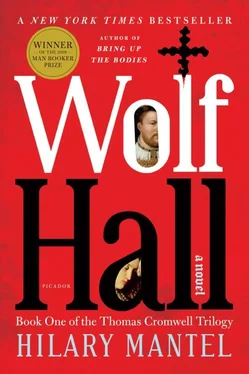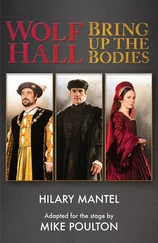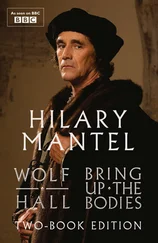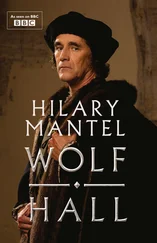Like all the other witnesses, he swirls his own cloak about him and kneels. At the sickening sound of the axe on flesh he darts one glance upwards. The corpse seems to have leapt back from the stroke and folded itself like a stack of old clothes – inside which, he knows, its pulses are still beating. He makes the sign of the cross. The past moves heavily inside him, a shifting of ground.
‘So, the king,’ he says. ‘From Gloucester, he strikes out to Thornbury. Then Nicholas Poynz's house at Iron Acton: does Poynz know what he's letting himself in for? From there to Bromham …’
Just this last year a scholar, a foreigner, has written a chronicle of Britain, which omits King Arthur on the ground that he never existed. A good ground, if he can sustain it; but Gregory says, no, he is wrong. Because if he is right, what will happen to Avalon? What will happen to the sword in the stone?
He looks up. ‘Rafe, are you happy?’
‘With Helen?’ Rafe blushes. ‘Yes, sir. No man was ever happier.’
‘I knew your father would come round, once he had seen her.’
‘It is only thanks to you, sir.’
From Bromham – we are now in early September – towards Winchester. Then Bishop's Waltham, Alton, Alton to Farnham. He plots it out, across country. The object is to get the king back to Windsor for early October. He has his sketch map across the page, England in a drizzle of ink; his calendar, quickly jotted, running down it. ‘I seem to have four, five days in hand. Ah well. Who says I never get a holiday?’
Before ‘Bromham’, he makes a dot in the margin, and draws a long arrow across the page. ‘Now here, before we go to Winchester, we have time to spare, and what I think is, Rafe, we shall visit the Seymours.’
He writes it down.
Early September. Five days. Wolf Hall.
In parts of medieval Europe, the official new year began on 25 March, Lady Day, which was believed to be the date when an angel announced to Mary that she was carrying the child Jesus. As early as 1522, Venice adopted 1 January as the start of the new year, and other European countries followed at intervals, though England did not catch up till 1752. In this book, as in most histories, the years are dated from 1 January, which was celebrated as one of the twelve days of Christmas and was the day on which gifts were exchanged.
The gentleman usher George Cavendish, after the death of Wolsey, retired to the country, and in 1554, when Mary came to the throne, began a book, ‘Thomas Wolsey, late Cardinal, his Life and Death.’ It has been published in many editions, and can be found online in an edition with original spelling. It is not always accurate, but it is a very touching, immediate and readable account of Wolsey's career and Thomas Cromwell's part in it. Its influence on Shakespeare is clear. Cavendish took four years to complete his book, and died just as Elizabeth came to the throne.
I should like to thank Delyth Neil for the Welsh, Leslie Wilson for the German, and a Norfolk lady for the Flemish. Guada Abale for lending me a song. Judith Flanders for helping me when I couldn't get to the British Library. Dr Christopher Haigh for inviting me to a splendid dinner in Wolsey's hall at Christ Church. Jan Rogers for sharing a pilgrimage to Canterbury and a drink at the Cranmer Arms at Aslockton. Gerald McEwen for driving me around and putting up with my preoccupations. My agent Bill Hamilton and my publishers for their support and encouragement. Above all, Dr Mary Robertson; her business as a scholar has been with the facts of Cromwell's life, but she has encouraged me and lent me her expertise through the production of this fiction, put up with my fumbling speculations and been kind enough to recognise the portrait I have produced. This book is dedicated to her, with my thanks and love.
Beyond Black
Every Day is Mother's Day
Vacant Possession
Eight Months on Ghazzah Street
Fludd
A Place of Greater Safety
A Change of Climate
An Experiment in Love
The Giant, O'Brien
Learning to Talk
NON-FICTION
Giving Up the Ghost












